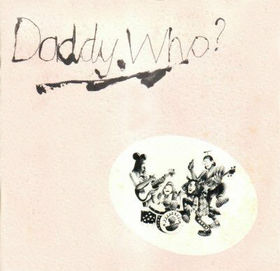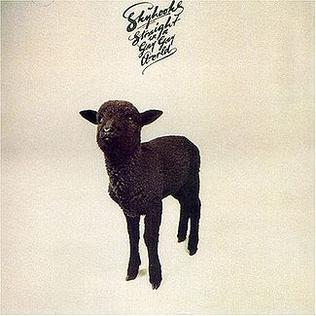Skyhooks were an Australian rock band formed in Melbourne in 1973. Their classic lineup (1974–1977) comprised Graeme "Shirley" Strachan (vocals), Greg Macainsh, Red Symons, Bob "Bongo" Starkie, and Imants "Freddie" Strauks (drums).
Patricia Mary Wilson is an Australian singer and journalist. Wilson wrote for Go-Set, a 1960s and 1970s pop music newspaper, under the pen-name "Mummy Cool" during 1971–1972. Wilson released several singles in the early 1980s including the hit single "Bop Girl". The song was written by her then husband Ross Wilson of the bands Daddy Cool and Mondo Rock. Pat currently resides in the Melbourne suburb of Elwood.

Ross Andrew Wilson is an Australian singer-songwriter, musician and producer. He is the co-founder and frontman of the long-standing rock groups Daddy Cool and Mondo Rock, as well as a number of other former bands, in addition to performing solo. He has produced records for bands such as Skyhooks and Jo Jo Zep & the Falcons, as well as for those of his own bands. He appeared as a judge on celebrity singing TV series It Takes Two from 2005. Wilson was individually inducted into the Australian Recording Industry Association (ARIA) Hall of Fame in 1989 and again as a member of Daddy Cool in 2006. Ross currently resides in the Melbourne suburb of Port Melbourne.

"Eagle Rock" is the debut single by Australian rock band Daddy Cool, released in 1971 on the Sparmac record label. It went on to become the best-selling Australian single of the year, achieving gold status in eleven weeks, and remaining at No. 1 on the national charts for a (then) record ten weeks. "Eagle Rock" also spent 17 weeks at the No. 1 spot on the Melbourne Top 40 Singles Chart. The song was re-released by Wizard Records in 1982, and reached No. 17 on the Australian singles chart.

Ross Andrew Hannaford was an Australian musician, active in numerous local bands. He was often referred to by his nickname "Hanna". Widely regarded as one of the country's finest rock guitarists, he was best known for his long collaboration with singer-songwriter Ross Wilson, which began as teenagers, with The Pink Finks and forming the seminal early '70s Australian rock band Daddy Cool. Hannaford died of cancer after being diagnosed a year earlier.
Gary Young is an American-born Australian musician who was a founding member of Australian rock band Daddy Cool in which he played the drums and sang backing vocals. He also played drums with Jo Jo Zep & The Falcons amongst other bands. Young was twice inducted into the Aria Hall of Fame as a member of both Daddy Cool and Jo Jo Zep & The Falcons which were inducted into the Australian Recording Industry Association (ARIA) Hall of Fame in 2006 and 2007 respectively.

Living in the 70's is the debut album by Melbourne band Skyhooks. Released in October 1974 on the Mushroom Records label, the album achieved relatively little success until early 1975. It spent 16 weeks at the top of the Australian album charts from late February 1975, and became the highest-selling album by an Australian act in Australia until that time, with sales of over 330,000. In October 2010, it was listed at No. 9 in the book 100 Best Australian Albums. The album's eponymous track was ranked number 72 as part of Triple M's "Ozzest 100", the 'most Australian' songs of all time ranking.

Daddy Who?... Daddy Cool is the 1971 debut album by Australian rock band Daddy Cool.

Straight in a Gay Gay World was the third studio album by Australian rock band, Skyhooks. The album was released in August 1976. With the exception of "Million Dollar Riff", it was recorded at The Record Plant in Sausalito, California, after the band's first tour of the United States earlier in the same year. The title and songs are a sort of view the band had on their experience in the States. The album was produced by former Daddy Cool leader Ross Wilson. It peaked at No. 1 on the Australian charts.
Daddy Cool is an Australian rock band formed in Melbourne, Victoria, in 1970 with the original line-up of Wayne Duncan, Ross Hannaford, Ross Wilson and Gary Young. Their debut single "Eagle Rock" was released in May 1971 and stayed at number 1 on the Australian singles chart for ten weeks. Their debut, July 1971's LP Daddy Who? Daddy Cool, also reached number 1 and became the first Australian album to sell more than 100,000 copies. The group's name came from the 1957 song "Daddy Cool" by US rock group The Rays. Daddy Cool included their version of this song on Daddy Who? Daddy Cool.
"Daddy Cool" is a song by US doo-wop group The Rays and was released on Cameo Records as the B-side of their 1957 single "Silhouettes". It became a No. 3 hit on the Billboard Pop singles chart. The song was written by Bob Crewe and Frank Slay, who had also written the A-side, "Silhouettes". The song became a No. 1 single on the Australian singles charts when covered by novelty band Drummond in 1971, and remained there for seven weeks. UK cover band Darts also had a hit single with the song, which reached No. 6 in 1977.
Sons of the Vegetal Mother were an Australian "esoteric special-occasion progressive band", formed in late 1969, with a floating line-up based around the nucleus of Ross Wilson and Ross Hannaford. A side-project of the band, formed in 1970 was Daddy Cool, which played 1950s doo-wop music plus some originals. Daddy Cool were to eclipse their parent band when their debut single "Eagle Rock" reached No. 1 on the Australian National charts.
Mighty Kong were an Australian 'supergroup' successor to Daddy Cool, which broke up in August 1972. It was also the fifth in the line of groups that featured singer-songwriter Ross Wilson and guitarist Ross Hannaford, which began with Pink Finks in 1965. Despite its all-star line-up, drawing from three of the top groups of the time, the band was short-lived and never really achieved its considerable potential, effectively relegated to being a footnote in the story of Daddy Cool.

Sex, Dope, Rock'n'Roll: Teenage Heaven, released as simply Teenage Heaven in the US, is the second studio album by Australian rock band Daddy Cool, released in December 1971. It reached number 15 on the Kent Music Report, and contains the hit single "Hi Honey Ho". It was their last studio album for 34 years, until the release of their 2006 album, The New Cool.

Singles and B Sides is a compilation album released in 1994 by Australian band Skyhooks.
Wayne Ian Duncan was an Australian rock musician. In 1970 he was a founding member of the doo-wop band, Daddy Cool, providing bass guitar and backing vocals. They were inducted into the ARIA Hall of Fame in 2006. During his career he had also been a member of the Rondells, Sons of the Vegetal Mother, Gary Young's Hot Dog, Jane Clifton and the Go Go Boys, the Black Sorrows, and the Hornets. In late November 2016 Duncan had a stroke and died a week later, he was survived by his domestic partner, Anne, and by two children. According to Australian music journalist, Ian McFarlane, "Duncan was never a sedate bassist. One only has to listen to some of the latter-day DC material... to hear how inventive his playing could be."

Daddy's Coolest is the sixth compilation album by Australian rock band Daddy Cool, released in 1982. The album peaked at number 5 on the Australian Kent Music Report and at number 29 on the Recorded Music NZ albums charts. It includes tracks from Daddy Cool's two studio albums Daddy Who? Daddy Cool and Sex, Dope, Rock'n'Roll: Teenage Heaven. The album was re-released in 1992, which reached number 35 on the ARIA Charts.
"Come Back Again" is an Australian rock song, released by Daddy Cool in September 1971 on the Sparmac record label. It reached number 3 in the Australian charts.
"All My Friends Are Getting Married" is a song by Australian band Skyhooks, released in June 1975 as the second and final single from the band's second studio album, Ego Is Not a Dirty Word. It is written by the group's bass guitarist, Greg Macainsh and was produced by Ross Wilson. The song peaked at number two in Australia.

"Happy Hippy Hut" is a song by Australian group, Skyhooks, released in August 1994 as a double-A sided split single with "The Ballad of Oz" by fellow Australian group, Daddy Cool. The single peaked at number 35 on the ARIA Singles Chart, remaining in that position for three consecutive weeks. Daddy Cool's lead singer, Ross Wilson, was Skyhooks' early record producer.











